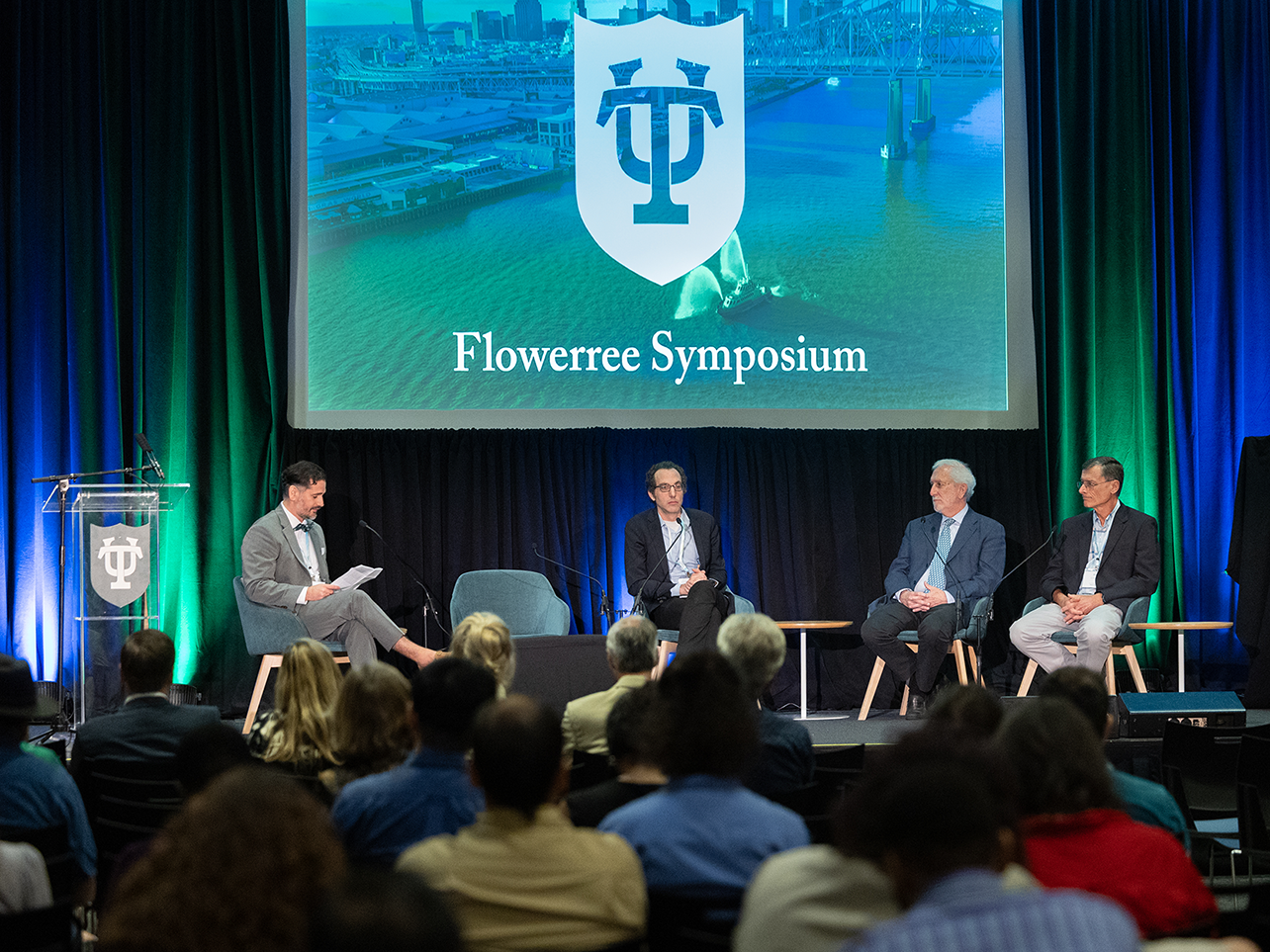Flowerree Symposium explores climate change research and policies
Leading researchers and policy experts from across the country gathered at Tulane last week to discuss the growing challenges and emerging solutions to one of society’s most consequential threats – climate change.
The Flowerree Symposium, which convened Oct. 8 at the Lavin-Bernick Center for University Life, was established in 2021 through a gift from David and Jane Flowerree. The gathering focused on Tulane’s role in addressing this global challenge.
President Michael A. Fitts opened the symposium, joined by Hridesh Rajan, dean of the School of Science and Engineering, and Brian Edwards, dean of the School of Liberal Arts.
“This is the epitome of what we do best at Tulane: crossing disciplines and boundaries to find answers to the most pressing questions of our time,” said Fitts.
Fitts also thanked David and Jane Flowerree, who were in attendance, for the gift that allowed this symposium to happen. “Their visionary support is helping us bridge science and policy and nurture unconventional thinking,” he said.
The symposium was anchored by keynote addresses by the current holders of Flowerree Professorships, Sönke Dangendorf and Joshua Basseches.
Dangendorf, the David and Jane Flowerree Assistant Professor in River-Coastal Science and Engineering, spoke about his research on accelerated sea level rise and flooding along the East and Gulf Coasts of the United States.
“We need a better understanding of sea level changes from the past to better predict them into the future,” said Dangendorf, as he discussed the different elements that contribute to sea level rise and how they impact communities in coastal states.
Basseches, the David and Jane Flowerree Assistant Professor in Environmental Studies and Public Policy, spoke about his research on state-level renewable energy policy across the nation.
“Most people only hear the bumper sticker, ‘Twenty percent renewable by a certain year,’ and that’s what headlines focus on,” said Basseches, “but there’s a tremendous amount of detail that can really affect how much these policies can and can’t move the needle.”
Basseches discussed how his research has revealed that the existence and effectiveness of renewable energy policies in various states is dependent in part on whether or not the state’s electric utility companies operate as vertically-integrated monopolies, where the electric utility company controls everything from production to distribution. His research finds that vertically-integrated monopoly electric utility companies have more impact on limiting renewable energy policies than the political party of politicians or than fossil fuel production levels in a given state. According to Basseches, states in which utility companies operate as vertically-integrated monopolies tend to be more limited in the robustness of their renewable energy policies.
Speakers from numerous institutions shared perspectives from both science and policy backgrounds, emphasizing the importance of understanding each other and working together across traditional disciplinary lines.
Robert Kopp, professor and co-director of the University Office of Climate Action at Rutgers University; Donald Boesch, Tulane alumnus, professor emeritus and president emeritus of the Center of Environmental Science at the University of Maryland; and Rick Luettich, alumni distinguished professor and director of the Center for Natural Hazards Resilience at the University of North Carolina at Chapel Hill spoke on their environmental research.
Joshua Macey, associate professor at Yale Law School, Davante Lewis, public service commissioner for District 3 in Louisiana, and Jesse Keenan, Favrot II Associate Professor of Sustainable Real Estate and Urban Planning at Tulane, discussed policies related to the climate.
Student researchers also had the opportunity to showcase their work at a poster presentation during the lunch break. Undergraduate, graduate and postdoctoral researchers from across Tulane highlighted the variety of research related to environmental studies being conducted at the university.
The symposium also included a screening of the film “Hollow Tree”, a documentary which follows three teenagers coming of age in Louisiana as they learn about how climate change is affecting their home. The screening was followed by a discussion with the director and protagonists of the documentary, moderated by D. Jelagat Cheruiyot, senior professor of practice in the School of Science and Engineering.

